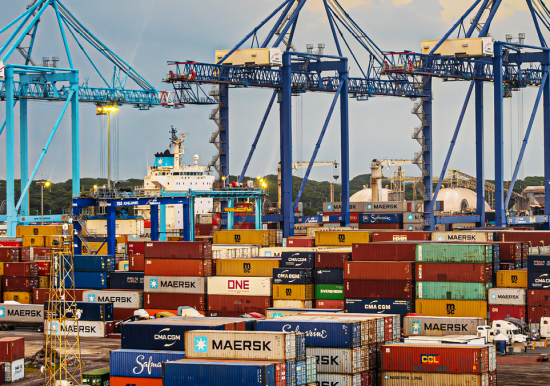
Country Spotlight 2025 & Practitioner Story: Lithuania
Lithuania, the largest Baltic country and economy, is one of the top five improvers in the region, rising to 25th globally in 2025 from 30th in 2021. In the same period, the country has made notable strides in Leadership & Foresight, particularly excelling in the Long‑Term Vision and Adaptability indicators. Its “Lithuania 2050” national strategy guides future development in addressing critical issues such as climate change, demographic transitions, technological trends, and geopolitical shifts.1
Building on a robust regulatory framework and stable institutions, Lithuania has also made significant gains in Attractive Marketplace, particularly in the Attracting Investments indicator. A key focus has been the development of its tech sector. Initiatives such as GovTech Lab Lithuania foster innovation in the public sector by identifying challenges that can be solved with emerging technologies, engaging startups and small and medium-size enterprises to develop GovTech solutions.2 Lithuania’s digital transformation is bearing fruit, with startups contributing over EUR 100 million in taxes to the national budget for both the second quarter ended June and third quarter ended September 2024.3
Lithuania’s CGGI Rank

Lithuania’s Pillar Dashboard

Endnotes
- Lithuania’s vision for the future “Lithuania 2050”. (2023). https://lrv.lt/media/viesa/saugykla/2023/12/x4ltEIwkfxE.pdf
- GovTech Lab Lithuania. (2024). What is GovTech Lab?. https://govtechlab.lt/about/
- Brand Lithuania Team. (3 December 2024). Strong Growth of Lithuanian Start‑ups: Rising Taxes to the Budget and Increasing Salaries. https://lithuania.lt/news/business-and-innovations-in-lithuania/lithuanian-startups-show-strong-growth-rising-taxes-and-salaries/
Lithuania: Promoting Good Governance through Institutional Integrity
Lithuania’s consistent improvement in governance rankings demonstrates its sustained commitment to strengthening institutions, enhancing integrity and transparency, and upholding the rule of law. Its National Agenda on the Prevention of Corruption (NAPC) 2022–2033 embeds anti‑corruption measures into public administration and national governance, with the national anti‑corruption body, the Special Investigation Service (STT), playing a pivotal role in shaping and implementing systemic reforms to prevent corruption.1
Lithuania has made significant national efforts to strengthen governance through sound legal frameworks and policies. Our legal system is aligned with the European Union (EU) standards, prioritising transparency, judicial quality, and regulatory governance. In recent years, efforts have also been made nationally to improve strategic planning—both at the state level and within institutions. The aim is to ensure institutions have clear, actionable goals and measures to achieve their objectives.

Lithuania’s institutions prioritise evidence‑based decision‑making, and we are recognised as one of Europe’s leading open data trendsetters, both in the economy and in public sector governance. By making data more accessible, citizens, NGOs, and the media have better means to scrutinise institutions and hold them accountable. Contributing to data‑driven risk management, STT has developed a Big Data analytics model that enables more effective as well as timely identification and prevention of corruption risks.
Governance is a shared responsibility that relies on institutional cooperation. Understanding this, Lithuania actively engages in regional and European networks to strengthen policies and enhance cross‑border governance. Collaboration with international partners supports the adoption of best practices and continuous improvement in governance frameworks.2 For instance, Lithuania has enhanced its global role in anti‑corruption efforts in recent years. In 2024, it hosted the 21st International Anti‑Corruption Conference in Vilnius, which brought together over 2,000 experts, demonstrating Lithuania’s commitment to global cooperation.

A Strategy for Clean and Coordinated Governance
Effective anti‑corruption efforts cannot be the responsibility of any one institution: they require a coordinated approach that brings together a broad range of stakeholders—including public institutions, civil society, and businesses. Lithuania’s NAPC 2022–2033 represents a structured and coordinated strategy for the long term,3 with the STT actively monitoring its progress across various government sectors.
Recognising that corruption risks and governance challenges evolve, the strategy was designed to be adaptable. Its implementation is structured in shorter three‑year periods, allowing adjustments based on emerging trends, lessons learned, and shifts in the broader governance landscape. By providing a structured yet flexible roadmap, the NAPC strengthens integrity at all levels of society. It promotes the understanding that anti‑corruption efforts and effective management of corruption risks must be integral to all governance activities, ensuring long‑term resilience against corruption in Lithuania’s governance framework.
The NAPC strengthens transparency, accountability, and integrity across government and public administration levels. It includes measures to improve conflict of interest management, increase lobbying transparency, enhance whistleblower protections, and reinforce ethical leadership through public sector human resource management guidelines. For example, we set out annual anti‑corruption objectives in expectation letters to reinforce personal accountability for ethical governance.
The implementation of NAPC is coordinated at the highest level through a dedicated commission, which includes ministers and heads of key administrative and oversight institutions. The commission is chaired by the Prime Minister, with the Minister of Justice and the Director of the STT as acting heads. This composition ensures ethical leadership in anti‑corruption efforts and reflects the understanding that in addition to a strong legal framework, effective coordination is essential for aligning legal measures and ensuring the successful implementation of strategic initiatives.
Realising the National Anti‑Corruption Strategy
Lithuania’s National Agenda on the Prevention of Corruption (NAPC) aims to create a corruption‑resilient environment in the public and private sectors by focusing on three main areas. First, it seeks to shape anti‑corruption attitudes and enhance competencies. Second, it promotes sustainable political, managerial, administrative, and financial solutions that resist undue influence while ensuring high‑quality public and administrative services. Third, it strengthens corruption control mechanisms, supports the impartial administration of justice, and reinforces the rule of law. Specific objectives support these directions, and an implementation plan introduces concrete measures every year to drive progress. Regulatory frameworks alone are insufficient – effective implementation is key.
As a coordinating institution for the NAPC, the STT plays a central role in monitoring and evaluating its implementation. Every year, STT assess progress and provides recommendations to improve the process, ensuring that anti‑corruption efforts remain effective, responsive, and aligned with evolving challenges. Formal compliance does not automatically create impact: through implementation reports and active communication, STT takes a strong, results‑oriented approach to ensure that the strategy is effective and that meaningful progress is made in achieving national anti‑corruption goals.

Supporting Ethical and Professional Leadership
When promoting ethical leadership and building resilience to corruption in institutions, we use all available tools to support and empower decision‑makers in fostering integrity. Ensuring public sector leadership operates in a corruption‑resilient environment is one of our key priorities. One example is the strategic anti‑corruption guidelines we have introduced for newly appointed ministers. These guidelines provide an overview of corruption risks within their respective areas of responsibility and offer practical recommendations for minimising those risks. This initiative helps ensure that ethical leadership begins at the highest levels of government and extends throughout institutions.
In Lithuania’s anti‑corruption framework, public sector leaders are directly responsible for implementing anti‑corruption measures, and must lead by example. To support them, we equip leaders with the necessary knowledge and tools to foster transparency, set ethical standards, and create a culture where accountability is a priority. In addition to issuing guidebooks for public and private sectors, we launched the Integrity Academy, a knowledge‑exchange platform that connects experienced professionals with public sector organisations. Institutions that voluntarily join this initiative commit to actively creating an anti‑corruption environment while benefiting from expert advice and shared experiences.
Another recent initiative aims to foster ethical leadership and professionalism in the future generation of public institution personnel. Seven key Lithuanian institutions working in national security developed a new National Security undergraduate study programme at Mykolas Romeris University to equip professionals with specialised competencies for national security, law enforcement, and the public sector. Beyond technical expertise, the curriculum emphasises ethical conduct, accountability, and professional integrity. By aligning with the needs of strategic security institutions, this programme enhances institutional transparency, strengthens operational efficiency, and contributes to developing a highly skilled and ethical workforce in the national security sector.
Seeking and Sharing Best Practices in Regulatory Governance
In Lithuania, we emphasise learning from good practices and integrating high‑quality international recommendations into our legal and institutional frameworks. Our alignment with EU regulations and international standards set by organisations such as the OECD, the Council of Europe, and the United Nations have established a strong foundation for upholding core principles of good governance, including integrity, transparency, and the rule of law.
A systemic approach has been key to achieving results. Legal reforms, data‑driven government, and improvements in the accessibility and quality of public and administrative services have strengthened oversight mechanisms and increased institutional efficiency. A strong legal framework supports these efforts to ensure the independence of both law enforcement agencies and judicial institutions. The STT, with its broad mandate to combat corruption, continuously works to refine and strengthen legal mechanisms. To make the most of our mandate, we regularly submit legislative proposals to improve the Criminal Procedure Code, and recommend refinement of prosecutorial guidelines to streamline and accelerate pre-trial investigations.
Having worked in Lithuanian law enforcement for many years, I have personally seen a strong emphasis placed on enhancing inter‑agency cooperation, particularly in information sharing, capacity building, and joint training programmes. As a relatively small country with a population of less than 3 million, our resources, including those allocated to law enforcement, are not unlimited. However, we can achieve meaningful results and pursue higher level cases with a spirit of active cooperation. Hence, international partnerships and the exchange of best practices are deeply embedded in our development.4
Overview of Lithuania’s Anti-Corruption Assessment with OECD Standards: Regulation vs Implementation in Key Areas

Achieving Real Impact for Citizens
Satisfaction with public services is closely linked to citizens’ experience of government procedures. I have seen in practice how anti‑corruption measures can directly improve these services by making them clearer, more transparent, and more efficient.
As part of our anti‑corruption work, we make assessments of various state and municipal processes, including those that directly affect citizens. The risks we identify and the recommendations we provide contribute to meaningful improvements: such as faster and more transparent access to medical services, ensuring that funds for road and street repairs are allocated based on clear principles, improving housing adaptation for people with disabilities, enhancing passenger transportation services, or ensuring fair and transparent electricity consumption calculations.
Anti‑corruption education and raising awareness are measures that empower citizens. In my experience, they are most effective when they focus on areas with the most significant impact. For example, a recent national campaign, “To Give or Not to Give”, organised in cooperation with a non‑governmental organisation representing young doctors, encouraged local communities to discuss how healthcare services can be provided and received based on principles of transparency and integrity without informal payments to medical professionals—a practice that remains common among some residents.
As a trusted institution, STT also receives thousands of reports on potential corruption through our whistleblower channel, enabling us to respond quickly to possible corrupt activities affecting citizens and businesses.

Satisfaction with public services is closely linked to citizens’ experience of government procedures.
Challenges and Opportunities Ahead
Like many nations, Lithuania faces a rapidly evolving landscape shaped by geopolitical, technological, economic, and social factors. Ensuring transparency, integrity, and the rule of law are core to addressing future challenges and seizing opportunities.
The shifting geopolitical situation in the region further underscores the importance of maintaining transparency in public spending, particularly in defence and national security. Strong oversight mechanisms are crucial to safeguarding public funds and ensuring the highest standards of integrity in the national defence sector.
Another key issue is the increasing complexity and sophistication of corrupt practices, which are extending into financial systems, legislative processes, and the digital sphere. Cyber‑enabled fraud, cross‑border bribery, and the misuse of advanced technologies are challenges that require continuous adaptation in investigative tools and enforcement strategies. Effectively addressing these risks demands strong international cooperation, as corruption—particularly involving foreign actors or illicit financial flows—often transcends national borders.
At the same time, Lithuania has significant opportunities to strengthen its resilience against corruption. Advances in technology, particularly artificial intelligence and data analytics, can enhance criminal intelligence, investigative processes, and corruption prevention efforts. We are continually working to more effectively leverage these tools to better detect and respond to corruption risks, safeguarding our institutions and ensuring our governance systems and processes continue to function well.
Endnotes
- Lithuania was among the first to implement the Whistleblower Protection Directive, reinforcing safeguards for those exposing corruption. International evaluations, including those by the European Commission, the Council of Europe, the OECD, and the UNODC, have also recognised Lithuania’s advancements. In Transparency International’s 2024 Corruption Perceptions Index, Lithuania ranked 12th in the EU and 32nd globally, reflecting its steady progress in anti‑corruption efforts.
- Lithuania is also a member of the European Partners Against Corruption and the European Anti‑Corruption Network (EPAC/EACN), the largest network of anti‑corruption authorities and police oversight bodies in Europe, uniting 120 organisations from 39 countries, serving as a vital platform for collaboration and shared approaches to tackling corruption.
- Seimas of the Republic of Lithuania. (28 June 2022). Resolution on the Approval of the National Anti-Corruption Agenda for 2022-2033. https://www.stt.lt/data/public/uploads/2022/08/stt_darbotvarke_en.pdf
- A recent example is the collaboration between experts from the Basel Institute on Governance’s International Centre for Asset Recovery (ICAR) and the STT, where training on financial investigations, asset confiscation, and recovery further strengthens Lithuania’s capacity to combat financial crimes.
- OECD (26 March 2024). Anti-Corruption and Integrity Outlook 2024 – Country Notes: Lithuania. https://www.oecd.org/en/publications/anti-corruption-and-integrity-outlook-2024-country-notes_684a5510-en/lithuania_6d12e7bb-en.html

LINAS PERNAVAS
Director, Special Investigation Service, Lithuania
Linas Pernavas has been the Director of the Special Investigation Service of Lithuania since June 2023. As Head of the Lithuanian Police (2014–2019), he led significant police reforms, enhancing public safety and improving working conditions. He then served as Lithuania’s police attaché in the U.K. (2019–2023). In 2023, he was elected President of EPAC/EACN, the pan-European anti-corruption networks. He has received multiple honours, including the Officer’s Cross of the Order of the Grand Duke Gediminas.
More Stories


Global Influence & Reputation Country Snapshot: Türkiye

